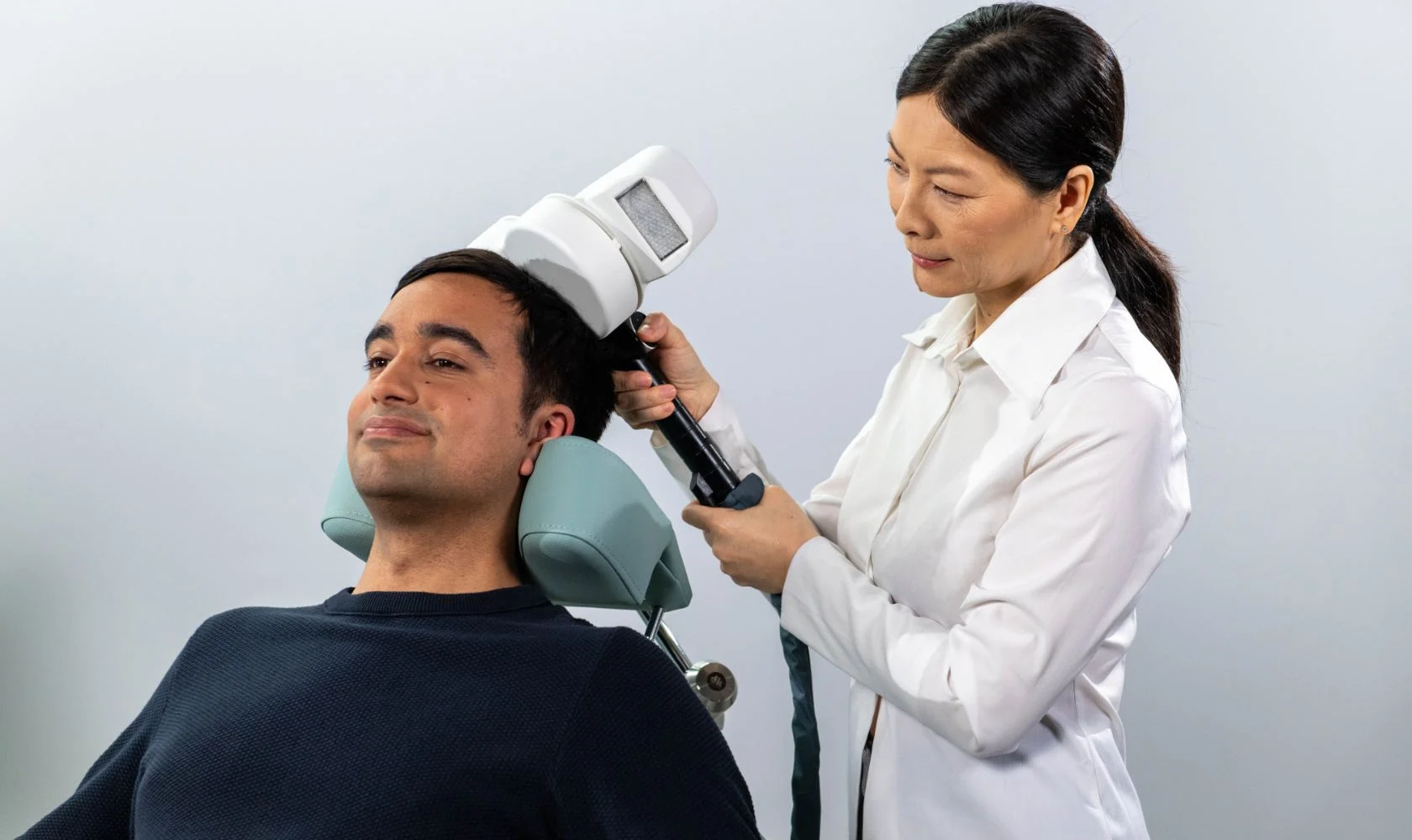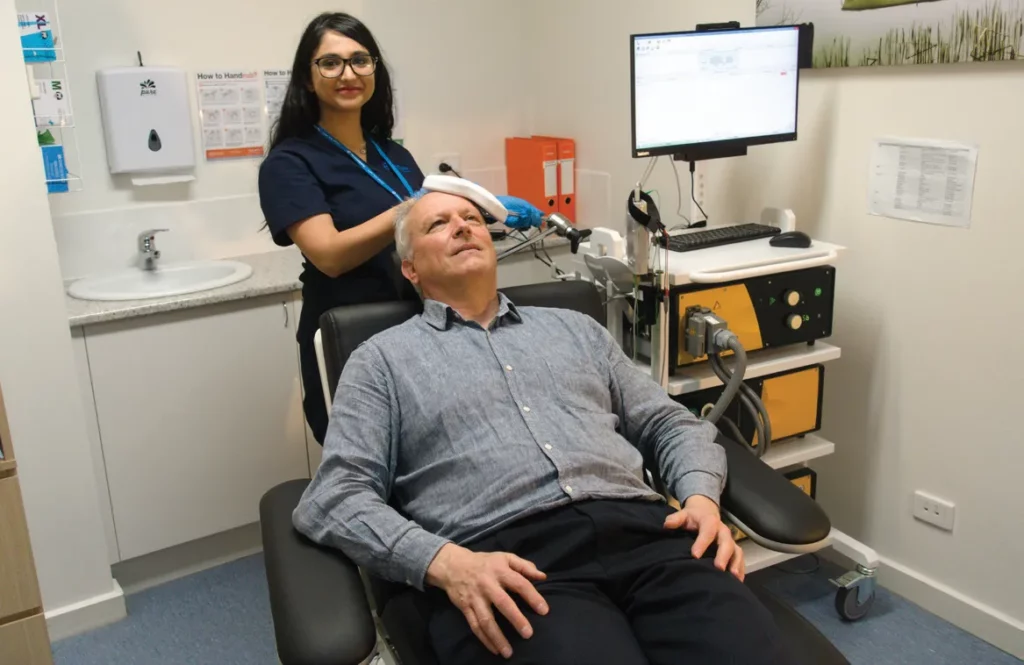Our highly personalized treatment plans have been shown to be 92.5% effective when tailored to your needs.

Sometimes traditional antidepressants don’t work, or they come with side effects that worsen your symptoms rather than alleviate them. Transcranial Magnetic Stimulation (TMS) is an FDA-approved treatment that awakens parts of the brain that are inactive. Eterne Wellness was created to provide patients with alternative treatments for depression, anxiety, PTSD, and other mental health disorders. Our high success rate stems from caring clinicians who administer individualized treatment plans, compared to other TMS providers who utilize a ‘cookie-cutter’ standard approach.
We specialize in personalized TMS therapy. When creating your therapy protocol, our medical team considers how your mental health disorder manifests in your unique brain functioning. Throughout your treatment, we closely monitor your progress and tweak the therapy based on your results. Our independent research has found that our success rate is significantly higher than that of other TMS providers, who often utilize unfocused, “one size fits all” TMS protocols. We have mastered the art of finetuning protocols to increase effectiveness by changing the duration of treatment, the frequency of stimulation, the number of sessions, and the placement on the head to target different brain areas.

At Eterne Wellness, our dedicated team is committed to guiding you on a journey towards healing and liberation from the weight of depression.
(725) 895-9300
Clinical studies show reduced activity in the left dorsolateral prefrontal cortex (DLPFC) region in the brains of people who have depression compared with people who don’t. The electromagnetic pulse created by TMS equipment stimulates the neurotransmitters and receptors in this region of the brain.
Depending on your mental health diagnosis, you may show reduced activity in other regions of the brain that TMS therapy can also help reawaken.
We offer a variety of different types of TMS therapy to our patients. We are big fans of theta burst stimulation, also called Express TMS, which more accurately mimics the brain’s universal signal to engage and increase neuroplasticity or learning in around 3 minutes.
TMS therapy is a noninvasive procedure that uses magnetic pulses—similar to those of an MRI machine—to awaken parts of the brain underactive in people who suffer from depression.
It is pharmaceutical-free and performed at our offices in Las Vegas by clinical specialists.
A typical full treatment course consists of sessions 5 days per week for about 6 weeks.
As of 2021, TMS therapy is an FDA-approved alternative treatment for Major Depressive Disorder, bipolar depression, Obsessive-Compulsive Disorder (OCD), and smoking cessation. However, we’ve also had fantastic success for individuals dealing with anxiety, insomnia, Post-Traumatic Stress Disorder (PTSD), panic disorder, adult ADHD , chronic pain, and even memory impairment.
TMS therapy is a noninvasive procedure that uses magnetic pulses—similar to those of an MRI machine—to awaken parts of the brain underactive in people who suffer from depression. As of 2021, TMS therapy is an FDA-approved alternative treatment for Major Depressive Disorder, bipolar depression, Obsessive-Compulsive Disorder (OCD), and smoking cessation. However, we’ve also had fantastic success for individuals dealing with anxiety, insomnia, Post-Traumatic Stress Disorder (PTSD), panic disorder, adult ADHD , chronic pain, and even memory impairment.
Clinical studies show reduced activity in the left dorsolateral prefrontal cortex (DLPFC) region in the brains of people who have depression compared with people who don’t. The electromagnetic pulse created by TMS equipment stimulates the neurotransmitters and receptors in this region of the brain. Depending on your mental health diagnosis, you may show reduced activity in other regions of the brain that TMS therapy can also help reawaken.
We offer a variety of different types of TMS therapy to our patients, as well as other alternative mental health treatments.
DISCLAIMER: SAINT™ is a trademark of The Board of Trustees of the Leland Stanford Junior University (“Stanford”) and has exclusively licensed such mark to Magnus Medical. Bespoke Treatment is neither endorsed nor licensed by Stanford or Magnus Medical, nor claims to be offering the SAINT protocol as prescribed by Stanford University et. al. or Magnus Medical.
Accelerated TMS is a relatively new alternative schedule in lieu of the standard TMS course. This approach was most recently popularized at Stanford University, where researchers developed the SAINT™ protocol (Stanford Accelerated Intelligent Neuromodulation Therapy™), which involved 9 minute sessions, once per hour, for a total of 10 sessions per day for 5 consecutive days. The SAINT™ protocol also used a functional connectivity MRI (“fcMRI”) in order to best place the TMS coil in order to best inhibit a deep structure of the brain called the subgenual cingulate cortex. The results were that 90% of participants experienced remission. While the SAINT™ protocol is currently unavailable outside of clinical trials, we are able to offer Accelerated TMS, which also utilizes 10 sessions per day for 5 days. The most common side effects reported are temporary fatigue and headaches. Neuroscientists are quite encouraged by the option for faster treatments with even better results, given that standard TMS in most clinics ranges from success rates in the 50-80% range.
The FDA has approved TMS treatment schedules for up to 6 weeks, with varying intervals and session lengths that have shortened over time. Most recently, FDA approved intermittent theta burst protocol, which is administered in 3 minute increments. Accelerated TMS uses this theta burst frequency 3 times in a row, for a total of a 9 minute session.
To learn more about Accelerated TMS, please read our article Everything You Need to Know About the Accelerated TMS/SAINT™ Protocol.
This approach has now been examined by two randomized clinical trials (the gold standard for clinical research), which have shown favorable results: in the first study, 90.5% of participants achieved remission, while in the second study, 79% of people doing Accelerated TMS achieved remission by day 5.
While most practitioners treat conditions in an isolated way, following a cookie-cutter script to treat patient after patient, we’ve found that personalized and comprehensive treatment strategies yield far better results. The IOP is 100% tailored to you and your history — no two treatment plans are alike — so you can finally break through and find the long-lasting results you’ve been looking for.
Length: Where our standard TMS treatment is for 30 sessions over a 6-week period, the accelerated protocol involves 10 treatments a day for 5 days (“Accelerated TMS”).
Coverage: At this time only Standard TMS is covered by insurance.
They are both FDA cleared.
Before beginning treatment, people may want to weigh the pros and cons of TMS therapy. The best parts about TMS are that it is safe, medication-free, has a high success rate, and produces results that last long after the treatment is over. Additionally, TMS can be covered up to 100% by most major insurers. The negative aspects of TMS are that it can cause mild headaches in some people and that patients must come into the office every day for 4 to 6 weeks, Monday through Friday.
Eterne Wellness conducts thorough evaluations to determine if TMS therapy is right for you. Whether you are looking for alternative treatments for depression that don’t involve medication, or you’ve tried a number of medications already with little to no results and are looking for scientifically proven therapies for treatment-resistant depression, you may be a good candidate for TMS. However, there are some situations in which TMS therapy isn’t appropriate, including if you have:
-Metal in or around your head (braces and dental fillings are safe)
-Pacemakers
-Implanted cardioverter defibrillators
-Vagus nerve stimulators
-Epilepsy
If TMS isn’t right for you, Eterne Wellness also offers ketamine treatment including infusions and intranasal sprays, and other alternative therapies such as neurofeedback.
Our team initially determines the exact location of the DLPFC in your brain (every brain is a bit different).
TMS therapy is non-surgical and does not require anesthesia sedation. During your session, you sit in a comfortable chair with the TMS equipment positioned at a specific point on your head. Most patients report a light tapping sensation on their forehead, but it is not painful. We are with you during every single treatment session and are always available should you have any questions or concerns. In between sessions, you are free to either lounge in our office, run errands, get some work done, or spend time with loved ones.
TMS doesn’t cause any disruptive side effects. Some patients report temporary, mild headaches after their sessions. However, you can drive yourself to and from your appointments. Other patients may experience mild facial movement during the stimulation, which ceases immediately once the treatment is over.
See a video of what it is like here (INSERT VIDEO)
The cost for our Standard TMS is $200 a treatment, but we do accept most major insurances.
Call us at 725-895-9300 or schedule your evaluation by clicking here